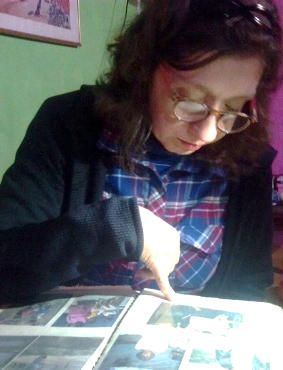Sarah L. Richardson

Anthropology Ph.D. Program
Year of Entry: Fall 2013
Advisor: Sarah E. Wagner
Committee Members: Josh Bell, Alex Dent, Ilana Feldman
State violence and terror; impunity; human rights and values; transitional justice; neoliberalism; visual and material culture, especially photography and textiles; semiotic anthropology; feminist anthropology; museum collections; Colombia; Latin America.
Ms. Richardson is a political and visual anthropologist studying State violence, civil and transitional justice, and the politics of memory in Colombia. Her dissertation, “Viviendo la Impunidad: State Terror, Arrangements of Meaning and Value, and the Social Condition of Impunity in Early Post-Accord Colombia,” investigates the social dimensions of long-term, entrenched impunity for grave human rights violations perpetrated by or with the complicity of State agents in Colombia. The dissertation shifts discussions of impunity away from juridical and institutional frames of reference to theorize impunity as a social condition lived by victims of State crime. Impunity is generally understood as absence—of accountability as well as of loved ones and of knowing what happened to them. This project instead investigates impunity’s presences and what is produced in its wake: the traces of loss, patterns of ongoing harm, and material and multisensorial artifacts—photographs, banners, murals, fabric panels, chants, performances, plantings, testimonies, and t-shirts—that make impunity’s effects visible. The work has been funded by the National Science Foundation, the Columbian College of Arts and Sciences, and the Institute for Ethnographic Research.
Richardson’s second project, “Vivid Invisibility: Molas, Mestizaje, and the Cross-Border Material Culture of the Gunadule of Colombia and Panama,” grew out of a 2015 fellowship at the Smithsonian Institution’s Summer Institute for Museum Anthropology (SIMA). Molas are bright, multilayered fabric panels sewn by Gunadule women. The Gunadule stand as a single, united nation, but their lands have been divided by the settler border separating Panama from Colombia. The project investigates the political economy and symbolic heft of molas against a backdrop of the implementation of peace accords in Colombia, an imposed settler border, and Gunadule survivance as a single nation producing molas that share cosmological and cultural meaning but are produced under divergent circumstances.
ANTH 3702 Anthropology of Latin America
Forthcoming
Wagner, Sarah E., Maria Alexandra Lopez-Cerquera, and Sarah L. Richardson. “Techno-Scientific Truth-Making: Forensic Science and Inventions of Repair.” In The Oxford Handbook of Transitional Justice, Jens Meierhenrich, Alexander Laban Hinton, and Lawrence Douglas, eds. Oxford University Press.
Accepted, pending revisions
Richardson, Sarah. “Extensive but Partial Collection: Investigating Absence within NMNH’s Gunadule Molagana.” In Putting Theory & Things Together: Working with Museum Collections, J. Bell and J. Shannon, eds. Washington DC: Smithsonian Institution Scholarly Press.
In Preparation
“‘The Impunity is Palpable’: State Terror, Photographs, and Claiming to Matter in Colombia’s Galleries of Memory”
M.A. (Anthropology) 2017, George Washington University
M.A.Ed (Education) 2006, Pacific Lutheran University
B.A. (Sociology/Anthropology) 1997, Middlebury College

